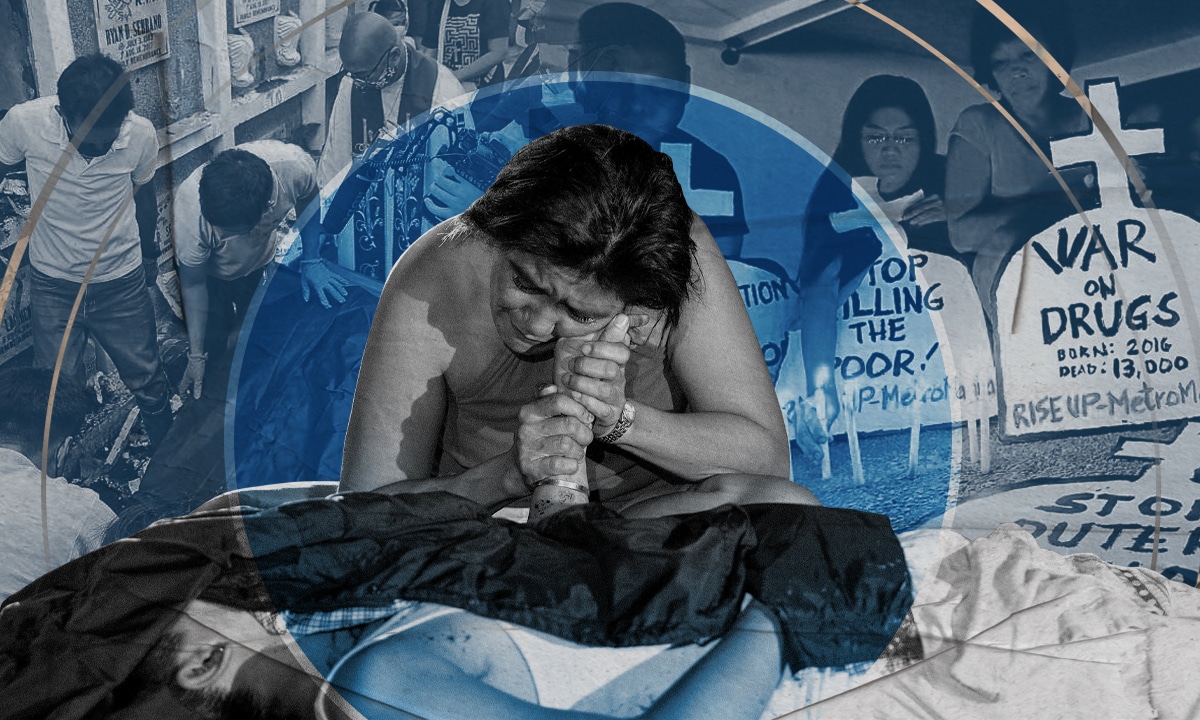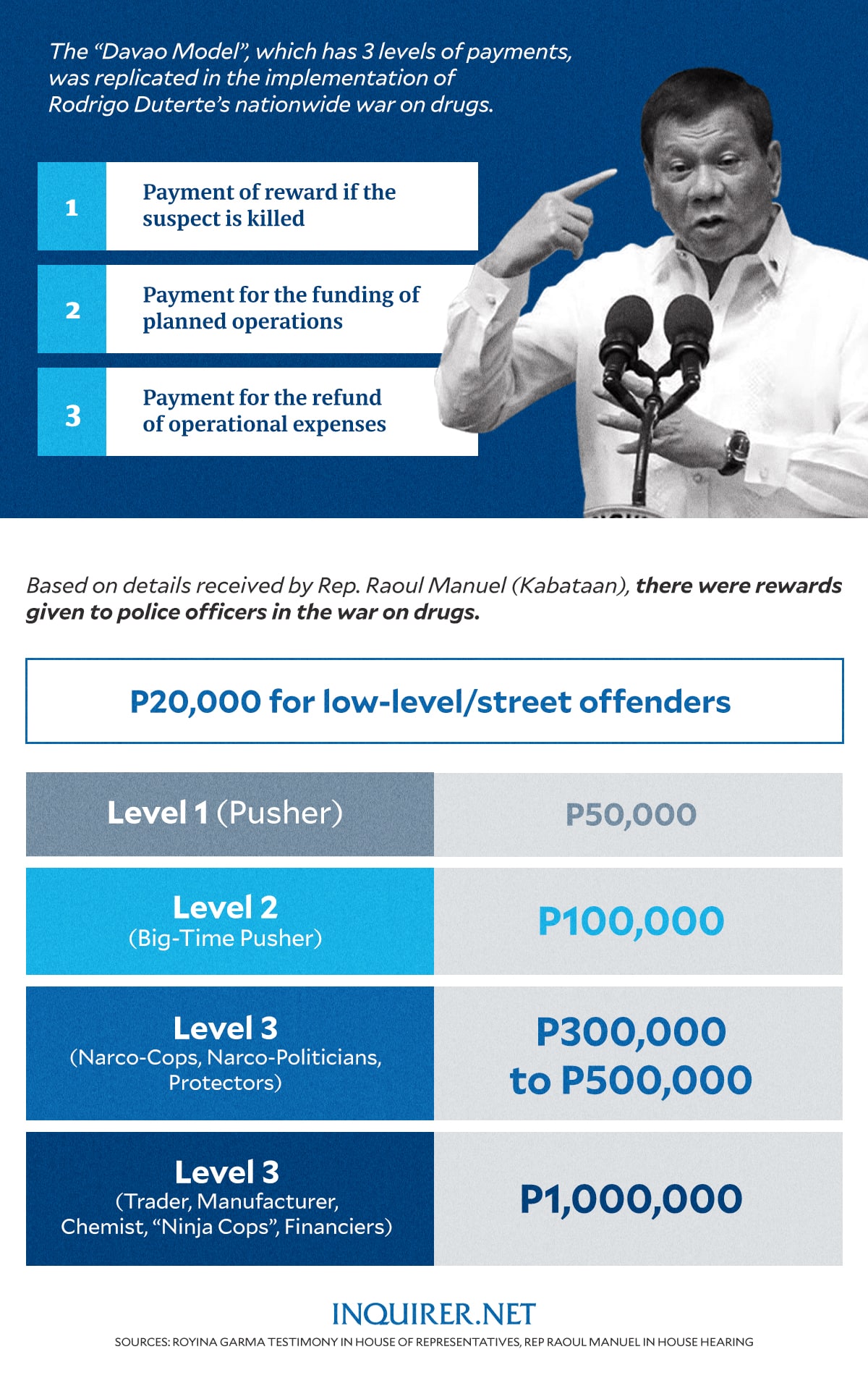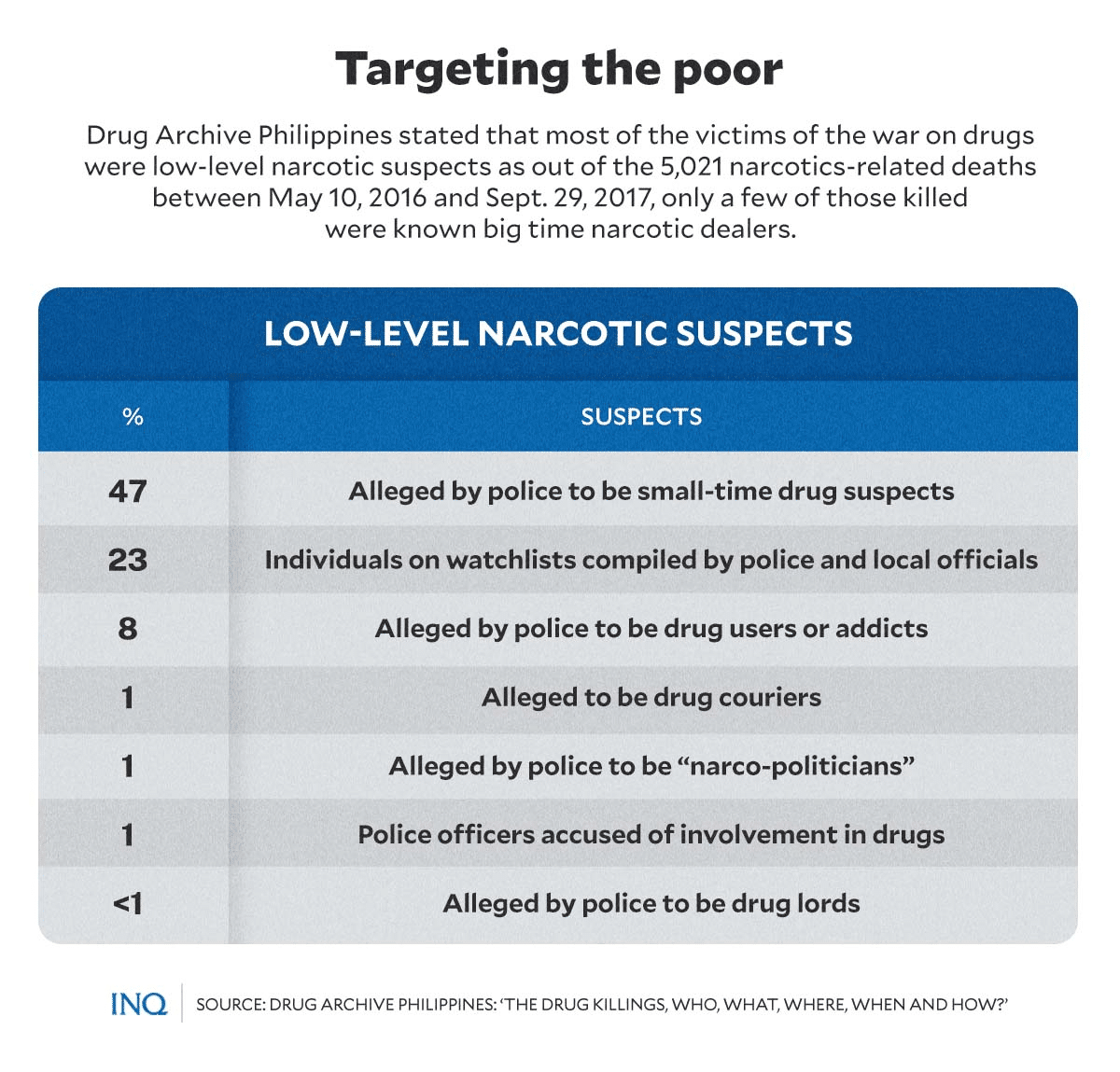
casinyeam Drug war bombshells show one thing: ‘Duterte didn’t care for human life’
" alt="Drug war bombshells show one thing: Duterte didnt care for human life" width="1200" height="720" data-lazy-srcset="https://newsinfo.inquirer.net/files/2024/10/CRIME-AGAINST-HUMANITY-FILEPHOTO-07112024-1.jpg 1200w, https:/
-

WAR ON DRUGS composite image from Inquirer file photos
MANILA, Philippines — Justice seems elusive for thousands of victims, killed in cold blood, of Rodrigo Duterte’s war on drugs in Davao City and the rest of the Philippines, where his “model” had been replicated as soon as he got elected to Malacañang.
This, as the result of the investigation of the Commission on Human Rights, which was led then by Leila de Lima, into the killings by the “Davao Death Squad”, or DDS, in Davao City, where Duterte served as mayor for decades, never saw the light of day.
Article continues after this advertisementREAD: Lacson: We’ve heard of drug war’s rewards system, but no one testified
FEATURED STORIES NEWSINFO Leon may turn into typhoon; Signal No. 1 over parts of Luzon, Visayas NEWSINFO House committee chair cites 2 possible grounds for Sara impeachment NEWSINFO Duterte takes ‘full legal, moral responsibility’ for drug warNo one in Davao City, too, was willing to expose the systematic killings, a model that is said to have been the reason that cases of EJKs in Duterte’s bloody anti-drug campaign reached 30,000, based on estimates by rights groups that kept track of the killings either by vigilantes or the police.
But on Oct. 11, almost 10 years since Duterte became president, as the House of Representatives, which was silent over the killings when Duterte was still in office, initiated an investigation, a revelation that no one expected to ever come to light was made by a retired police official close to the strongman.
Article continues after this advertisementREAD: ‘Drug war’ reward scheme real, evidence shows – House execs
Article continues after this advertisementRoyina Garma, a retired police colonel who served as the general manager of the Philippine Charity Sweepstakes Office, confirmed that the previous administration replicated the Davao City model of the war on drugs, where officers involved in killings are rewarded.
Article continues after this advertisement
GRAPHIC: Ed Lustan/INQUIRER.net
‘Sociopath’As pointed out by De Lima, who was elected to the Senate in 2016 but charged and detained on cases filed by the Department of Justice during the Duterte years, Garma’s revelation “only confirms what he had been telling us since day one”—that Duterte “does not care about human rights, or human lives.”
De Lima, who was eventually cleared of all the charges filed against her, said that Duterte, throughout his presidency, had defended his ill-famed stand by saying that “he cares more about keeping our streets safe for ordinary people than due process for criminals.”
Article continues after this advertisementRELATED STORY: ‘I don’t care about human rights’: Duterte and the failure to see human rights’ role in progress
Looking back, everytime Duterte said that he does not care about human rights, he was not engaging in some hyperbole or just driven by exasperation at constant criticism of his record on human rights both as mayor of Davao City and as president of the Philippines. He meant every word he said.
“My order is shoot-to-kill. I don’t care about human rights. Believe me. I don’t give a shit about what they will say. This war is against drugs, we have a crisis. I will not hesitate to kill you,” he said in 2016, especially pointing to “narco-politicians”.
READ: Evidence in Duterte ICC case: His ‘kill’ rhetoric, words
“But this is not true,” De Lima stressed, saying that “killing innocent people is the worst anyone can do.” She pointed out to INQUIRER.net that “if you don’t care about that, there is basically nothing in the world that you would actually care for.”

GRAPHIC: Ed Lustan/INQUIRER.net
According to data from the Drug Archive Philippines, a research consortium initiative, out of the over 5,000 drug-related deaths compiled by the Ateneo Policy Center from May 10, 2016 to Sept. 29, 2017, the stretch considered as the most bloodstained, close to 80 percent were poor.
There were children and students killed, too.
Killings rewardedBased on what Garma said in her affidavit, which she read at the House quad committee hearing, the Davao City model of the war on drugs has three modes of payment: (1) for every suspect killed; (2) for the planned operations; and (3) for the refund of operational expenses.
READ: Garma bares monetary reward range under ‘Davao drug war template’
As stated by Rep. Raoul Manuel (Kabataan), he received information that the reward given to police officers who enforced the deadly policy averaged from P20,000 for low-level offenders, P50,000 for pushers, P100,000 for big-time pushers, and P300,000 to P500,000 for narco-cops/politicians and protectors.
The highest reward, worth P1 million, is given for slain high-value targets such as traders, manufacturers, chemists, “ninja cops”, and financiers.
RELATED STORY: Espenido told: Pogo money used to reward anti-drug units
When De Lima appeared at the hearing on Tuesday, Oct. 22, she said that based on her findings in 2009, there was indeed a reward for the killings, pointing out that from 1988 to 2000, the amount was P15,000: P5,000 for the handler and P10,000 for the assassin.
Then from 2001 to 2016, the reward for the DDS was still P13,000 to P15,000, she said—P3,000 to P5,000 for the handler, P7,000 to P8,000 for the assassin, and P500 to P1,000 for the civilian informants who were called “abanteros” in Davao City.
She pointed out, however, that in the revelation made by confessed DDS hitman Arturo Lascañas the reward was even as high as P100,000 to P1 million for what was considered as “special projects.” De Lima said the funds were believed to have come from Duterte’s office.
The DDS, she said, was composed of former communist rebels who were hired as hitmen, with active police officers serving as their handlers.
DDS ‘Superman’As De Lima said, Lascañas’ affidavit in 2016, which was handed over to the International Criminal Court investigating crimes against humanity allegedly by Duterte in the Philippines, showed that the DDS was not only a mere organized gang but a group that reported directly to Duterte, who was called “Superman”.
RELATED STORY: Garma says Davao drug war template, rewards system applied in entire PH
De Lima said that “Superman” was the highest leader or mastermind of the DDS, while SPO4 Samson Buenaventura was alleged to be the logistics-finance and death clearance officer. Lascañas, who was a SPO3 then, was the overall team leader for operations and planning.
SPO4 Bienvenido Laud and SPO3 Jim Tan were allegedly in charge of the mass graves.
The DDS safehouse was stationed at the National Police Commission’s compound in Barangay San Pedro, Davao City, but in 2001, as Duterte became mayor again, the DDS was “upgraded” to make it appear as the “Heinous Crimes Investigation Section” of the Davao City Police Office.
As pointed out by lawyer Kristina Conti, of the National Union of People’s Lawyers, Duterte is a “master manipulator and performative politician,” saying that “behind every invocation of ‘people’s rights’ is a cunning intention in self-interest.”
Your subscription could not be saved. Please try again. Your subscription has been successful. Subscribe to our daily newsletter
SIGN ME UP RELATED STORY: After Dutertecasinyeam, fight vs drugs keeps anti-poor face
READ NEXT Isolated areas in Camarines Sur, Albay get aid via choppers, b... LOOK: Pro and anti-Duterte groups’ standoff outside Senate EDITORS' PICK Duterte admits to having 'death squad,' later insists it’s not one UAAP: 'Do-or-die' approach has UST winning again Marcos fetes 10 outstanding Filipinos Calls mount on EJK accountability ‘Leon’ may turn into typhoon; Signal No. 1 over parts of Luzon, Visayas LIVE UPDATES: Severe Tropical Storm Leon MOST READ Tiñga questions increase in Taguig council seats at SC Leon may turn into typhoon; Signal No. 1 over parts of Luzon, Visayas Duterte tells Senate: I have a death squad Leon slightly intensifies, nears typhoon category – Pagasa Follow @FMangosingINQ on Twitter --> View comments
Related News
Former President Rodrigo Roa Duterte is set to attend the Senate probe on his drug war.FILE PHOTO FROM BONG GO FACEBOOK PAGE MANILA, Philippines I did what I had to do. This was wh...
BEIRUT, Lebanon — UN peacekeepers in Lebanon warned Saturday against a "catastrophic" regional conflict as Israeli forces battled Hezbollah and Hamas militants on t...
